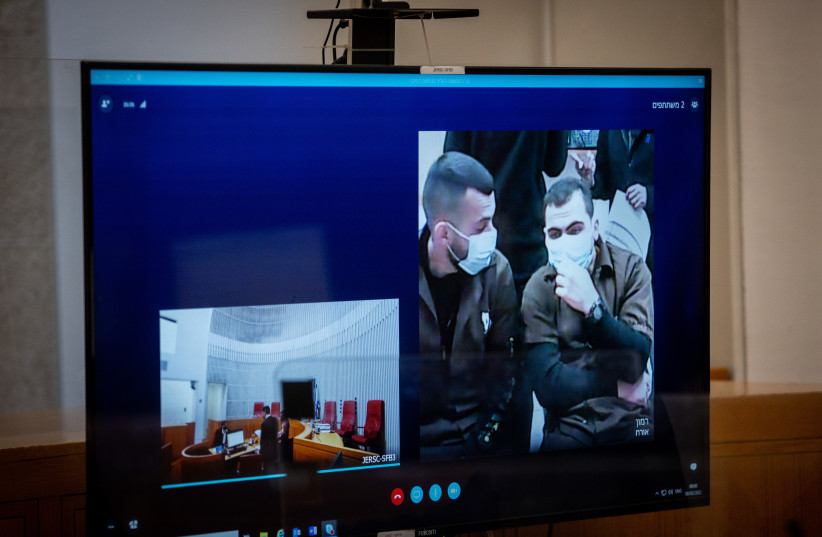The High Court of Justice ruled on Thursday that the law permitting the revocation of the citizenship of terrorists is constitutional, although it also canceled decisions by former interior ministers to revoke the citizenship of convicted terrorists Alaa Ziad and Mahmoud Mafarja.
Ziad is an Arab-Israeli who ran over and stabbed two soldiers and two civilians, one of whom was 15 years old, at Gan Shmuel near Hadera, and was convicted by the Haifa District Court of four counts of attempted murder.
Mafarja planted a bomb on a bus in Tel Aviv in 2012, wounding 24 people. He was convicted on charges of intent of aiding the enemy, attempted murder and causing serious bodily harm, and was sentenced to 25 years in prison.
What is the legal background?
The power to revoke citizenship was first enshrined in the Citizenship Law in 1952 and has been amended multiple times since then.
The law in its current form allows the interior minister to submit a request to a court to revoke the Israeli citizenship of a person if they acquired their citizenship using false information or if they committed an act that constitutes a “breach of allegiance to the State of Israel.” That means an act of terrorism, an act that constitutes treason or “serious espionage” or the acquisition of citizenship or permanent residence in enemy countries (i.e. Iran, Lebanon or Syria, among others).
The law used to allow the interior minister to decide on revocations but in 2008, it was amended to transfer the decision to the courts.
Before the cases of Ziad and Mafarja, the law had only been used once, in 2002, when the interior minister decided to revoke the citizenship of Israeli Arab citizens Nahed Abu Kishak, a senior figure in Hamas, and Keis Obeid, who defected to Lebanon and joined Hezbollah.

In the case decided in the High Court on Thursday, the justices ruled on both the specific cases of Ziad and Mafarja and the general constitutionality of the law itself. Chief Justice Esther Hayut stated that the law is constitutional, providing that those who remain stateless due to revocation would receive permanent residence permits in Israel.
The court decided to cancel the citizenship revocation decisions against Ziad and Mafarja, however, due to defects in how the requests for the revocations were filed. Justice Noam Sohlberg stated that the interior minister could resubmit the requests to revoke the citizenship of the two terrorists.
"Whoever acts intentionally to harm the State of Israel, can not be part of its community of citizens."
Interior Minister Ayelet Shaked
Interior Minister Ayelet Shaked welcomed the ruling, stating, “The High Court has confirmed the obvious: Whoever acts intentionally to harm the State of Israel cannot be part of its community of citizens. However, unfortunately, the High Court has adopted an interpretation that is contrary to the language of the law and required that terrorists be given a different permanent status in Israel.”
"Current experience shows that the use of the tool that the law allows to deny citizenship is discriminatory against only Arab citizens."
Israeli-based Arab rights NGO Adalah
The Israeli-based Arab-rights NGO Adalah expressed concerns about the ruling on Thursday, saying, “Although in the case before us no one’s citizenship has been denied and although the High Court has upheld the principle that a person cannot be left without status, this decision is dangerous because it paves the way for the use of an invalid tool contrary to international law. This decision was made even though the judgment itself confirms that there is no such arrangement in any country in the world.
Current experience shows that the use of the tool that the law allows to deny citizenship is discriminatory against only Arab citizens,” added the NGO.
“Terrorists should not continue to receive residency status or rights in a country against which and against whose citizens they fight with violence and terrorism. It is simple morality and common sense of any life-loving society, and it is a deterrent existential necessity in a country that is struggling for its existence against a cruel enemy,” Religious Zionist head Bezalel Smotrich said on Thursday.
“The High Court is once again inventing rulings contrary to the language of the law and the intent of the legislature and is harming the security of Israel and the peace of its citizens. This will be the focus of the upcoming elections in which we undertake to reform the Israeli legal system and base it on the values of Judaism, Zionism and healthy human morality.”
In April, the cabinet decided that a government committee will examine revoking National Insurance Institute benefits to Israelis who abetted terrorists.
The committee was set to consider ways to expand a 2012 law proposed by Yisrael Beytenu MKs that revoked 50% of welfare benefits for life to Israelis and legal residents of Israel convicted of terrorism, including having it apply to the terrorists’ relatives who aided them.
